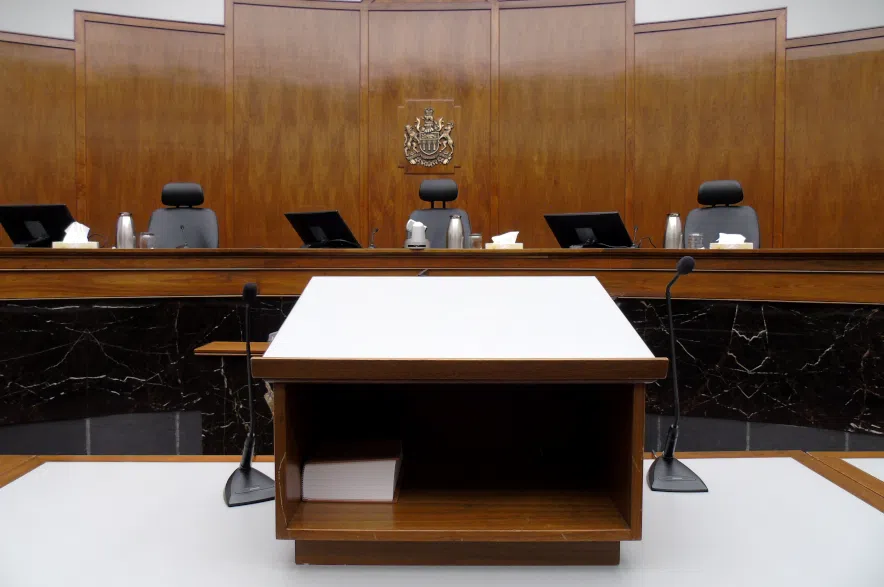The decision from the Saskatchewan Court of Appeal said everything UR Pride wanted it to say, according to Dr. j wallace skelton.
However, skelton, a board member of UR Pride and assistant professor of queer studies at the University of Regina, said it’s brought up two separate reactions.
“The decision absolutely says that our case is worth taking forward and that our case deserves to be heard, but it doesn’t actually offer any protection immediately to young people,” said skelton.
The court ruled against the Government of Saskatchewan’s appeal for the most part, saying the courts do still have jurisdiction to make a determination on the constitutionality of the pronoun law, despite the use of the notwithstanding clause.
That ruling moves things forward in that it will let UR Pride make those arguments, and skelton said that’s important because young people are being harmed by the law.
“They’re going to return in September, and not have access to names and pronouns, and today’s decision doesn’t change that yet,” said skelton.
UR Pride isn’t interested in appealing Monday’s decision, according to skelton, because it wants to get to the heart of the main case.
Read more:
- 2SLGBTQIA+ advocate frustrated as gov’t prepares pronoun law
- Minister defends pronoun law after government MLAs barred from Pride parades
- Wyant defends initial votes on pronoun legislation as ‘procedural’
Schools are key places for children to feel safe and supported, but skelton said trans, two-spirit and non-binary students feel less safe and less welcome at school now and, anecdotally, skelton said the government’s targeting of those young people has led to an increase in bullying and harassment from other students.
“If we are interested in safety of young people, and I really think we should be, we need to be ensuring that schools are able to be supportive places for students,” said skelton.
Among the wins for UR Pride in the decision was allowing the addition of a challenge to the law under section 12 of the Charter of Rights and Freedoms, which was not explicitly protected against when the government included the notwithstanding clause in the law.
The government could choose to amend the law this fall and include protections from challenge under section 12, but skelton said that would be more than they’ve seen from this government.
“They would need to be able to stand up and say ‘we are going to use the notwithstanding clause to override the rights of trans, two-spirit, and non-binary young people from not having to face cruel and unusual consequences,’” said skelton.
“And to stand up and say ‘this is going to cause harm and it’s going to cause harm that might meet the threshold of cruel and unusual’ and pass legislation to that, feels like a step further than we’ve seen so far, even from this government.”
The Government of Saskatchewan, in its short response to the decision, said it would continue to fight for parents’ rights to be involved in their children’s education. However, skelton said this law isn’t about parents being involved in education; that anyone in education would love for parents to be more involved.
“This is about trans, two-spirit and non-binary young people and being able to be called by names and pronouns that the young people know are right for them,” said skelton.
Referencing parents’ rights, skelton said it’s a misnomer and unfair labelling in this case.
Ruling reaffirms province’s stance
In a media conference Tuesday, when asked whether his government was planning to appeal the decision, Premier Scott Moe said the bill is constitutionally protected, afterwards reaffirming the province’s stance on the legislation.
“It’s not about putting anyone’s rights over the other,” Moe said, regarding whether parental rights outweighed those of students.
“It is the government’s position that parents do have a right to be involved in their children’s education, the classes they choose, the decisions that they’re making.”
According to Moe, the provincial government has asked school divisions across Saskatchewan to work with parents in developing policies that are acceptable and supported by them.
Law professor weighs in
Dwight Newman, a law professor with the University of Saskatchewan’s School of Law, said this case could very well go to the Supreme Court of Canada.
“Particularly because there’s a split decision at the Court of Appeal – which isn’t very common, it’s actually quite rare – that can be a basis sometimes that the Supreme Court of Canada would grant leave,” explained Newman on the Evan Bray Show Tuesday morning.
He said it could also be a factor that the Saskatchewan court disagreed with a decision in a similar case out of Quebec.
“When there’s a split decision between different courts of appeal it’s something that certainly motivates the supreme court, potentially to allow a case to be heard there,” he explained.
Newman disagreed with the majority decision, saying in his view, once the notwithstanding clause is used, there’s no reason for a court to make a declaration, and it’s not right for it to make a declaration.
With the notwithstanding clause in play, Newman said a declaration from the court would have no effect, but it could be symbolically important to some.











